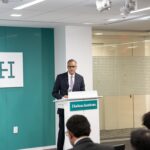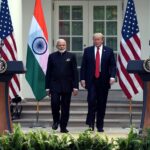President of the World Bank Group, Ajay Banga, has emphasized that a “Jobs-Focused Strategy” will be central to the 2025 Spring Meetings of the World Bank Group (WBG) and the International Monetary Fund (IMF), scheduled for April 21–26, 2025, in Washington DC. The strategy, he said, reflects the Bank’s “urgency and conviction that development must lead to opportunity.”
Speaking at a virtual press conference on April 16th, ahead of the Spring Meetings, Banga announced that the World Bank is prepared to scale its efforts, with more details to be shared during the meetings on the next phase of the private sector lab.
“We’re going to expand its membership to include the sectors that we believe are most critical to job creation, and these are energy and infrastructure, agribusiness, healthcare, tourism, and manufacturing,” he said.
He talked about the High-Level Advisory Council on Jobs led and co-chaired by President of the Republic of Singapore and former Deputy Prime Minister and Coordinating Minister for Economic and Social Policies, Tharman Shanmugaratnam, and former President of the Republic of Chile and Head of Government, Michelle Bachelet.
Banga underscored that job creation has become the cornerstone of the World Bank’s development agenda. Over the next decade, he noted, 1.2 billion young people are expected to enter the workforce in developing countries, yet current projections show these economies are only on track to generate 420 million jobs.
“And that gap is not just an economic issue. I think it’s a global risk, because without opportunity, the forces of fragility, of illegal migration, of instability, these forces grow stronger,” he warned.
Addressing questions about the impact of reciprocal tariffs proposed under President Donald Trump, Banga said, “I don’t know how to predict the timeline, because what I don’t know is how quickly you get to resolution on some of these specific country by country negotiations.”
However, he stressed the importance of sustained dialogue and negotiation. The quicker they do it, the better that will be, he said, adding that countries should continue engaging in regional and bilateral trade agreements with cooperative partners.
Banga acknowledged that ongoing uncertainty and geopolitical volatility are contributing to a more cautious investment environment.
“I think that’s going to affect our governments and businesses make their investment decisions right now. But meanwhile, interestingly, developing economies are playing a far more central role in global trade than they did, say, two decades ago,” he said.
He explained that countries dependent on export-led growth, especially those reliant on commodities or manufactured goods, are particularly vulnerable to disruption. Nonetheless, they retain policy tools to help navigate uncertainty and strengthen long-term resilience.
As an example, Banga noted that many developing countries maintain higher tariffs than their advanced counterparts, especially on key imports.
“I think that creates a real risk of reciprocal tariffs and, most importantly, lost competitiveness. So a broad-based liberalization, not just with favorite partners, can help offset these risks and actually expand market access,” he said.
Trade among developing nations is also on the rise. Banga highlighted that nearly half of exports from these economies now go to other emerging markets. He noted that more efficient border processes, reduced trade costs, clearer rules of origin, and decreased friction can boost trade volumes while supporting more stable and diversified growth.
While Banga acknowledged the uncertainty surrounding the future of global growth, he expressed confidence in the World Bank’s capacity to respond – drawing on experience from past global crises such as COVID-19 and the 2008–09 financial crisis. He said the Bank, in collaboration with the IMF and regional partners, will continue to provide technical support, financing, and infrastructure assistance to enhance productivity and promote trade in emerging markets.
He also reflected on the World Bank’s founding purpose – to foster a more stable and prosperous global economy to avoid conflict.
“This was a charity. It was a calculated investment in the global economic architecture, one that I believe has paid off many times over in these 80 years,” he said, citing the work of the institution’s five arms – International Bank for Reconstruction and Development (IBRD), International Development Association (IDA), International Finance Corporation (IFC), Multilateral Investment Guarantee Agency (MIGA), and International Centre for Settlement of Investment Disputes (ICSID).
“There’s no other institution that brings all of this together in one place, and that’s what makes the World Bank Group uniquely positioned to support countries and investors across the entire development journey,” he added. “I continue to believe that the World Bank Group is a smart investment for governments, for taxpayers and the private sector to partner with we’re on the move. We’re trying to change things here and look to deploy proven tools to unlock growth, to reduce fragility, and generate returns for people, for businesses and for the global economy.”
Reaffirming the Bank’s core objective is to create meaningful, and sustainable employment opportunities, he expressed, “The idea is to build a Bank that delivers what is demanded – jobs, because jobs is the best way to drive a nail in the coffin of poverty.”






